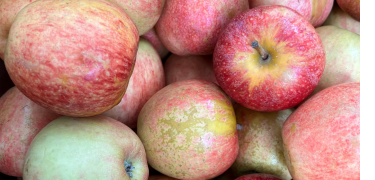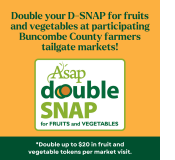
As we move further into the fall season, one like any other we have experienced, apples reach their prime for picking. Apples in autumn just make sense - the earthy red, orange, yellow, green, gold and brown colors of all their different varieties reflected in the changing leaves paired with quintessential fall flavors. Apples can help us feel at home - asking us to cozy up with a warm apple pie slice or hot mulled cider, or just a simple quick snack without the need for power or water to enjoy them. Apples can remind us of our resilience as they stand sturdy and stay hardy through intense weather, grow deep roots and diversity for generations, and yet still keep their sweetness about them through it all.
While our neighboring county, Henderson, is the largest apple producing county in North Carolina, Henderson based orchards continue to bring their apple abundance to Buncombe County farmers tailgate markets along with special treats like fresh pressed cider, apple donuts, and various apple preserves. We are thinking of all the orchards who lost trees, lost power, or sustained significant damage to their crops and farms. You can still find Creasman Farms at Asheville City, North Asheville, West Asheville, and Black Mountain markets and McConnell Farms at North Asheville. While not Henderson County, Lee’s One Fortune Farm is bringing some special apple varieties to East Asheville, Asheville City, Black Mountain, West Asheville, and River Arts District markets.
Search any recipe database for apple dishes and the results may be endless - but what is more classically fall and heartwarming than homemade applesauce and apple butter. If you are craving both, it is very easy to take your applesauce to the next buttery level. To make applesauce from scratch, pick out six pounds of your favorite mix of apples from the market - ask the farmer what varieties soften the easiest and have the best flavor for applesauce. Peel and core your apples, cut them into slices, and place them in a big pot on the stove. Add one cup of apple cider, juice from one lemon, one half cup of brown sugar (for a darker applesauce) or honey if desired, and spices of choice like cinnamon, nutmeg, allspice, pumpkin spice, or even locally grown ginger from Lee’s One Fortune Farm. Cook covered on medium heat for 25 minutes, stirring occasionally. Now comes dealer’s choice - do you like your applesauce chunky or smooth? To keep your applesauce on the chunkier side, use a potato masher or fork to break up the cooked apples. For smoother, use an immersion blender or transfer the applesauce to a blender in batches and puree.
To make apple butter from your pureed applesauce, just keep on cooking! Bring your applesauce to a boil then reduce to a medium boil, stirring often for 30-45 minutes until your mixture has thickened. You will know when it is ready when you drag a spoon across the bottom of the pot and leave a trail that will not fill up immediately. Store your applesauce and apple butters in airtight containers in the fridge or freeze some to save for later.
Not wanting to cook your apples quite yet? Put together a delicious fall salad with kale, crumbled feta, pumpkin seeds, cubed and roasted butternut squash, pecans, and chopped apples. Top with a balsamic vinaigrette or pick up Ali Rae Foods' seasonal dressing, Cranberry Sage Vinaigrette, starting this weekend at North Asheville and Black Mountain markets. Remember that you can find locally produced feta from Spinning Spider Creamery and Grassroots Farm and Dairy (both at North Asheville, West Asheville, and River Arts District markets).
Looking for a break from our new shared reality or a place to take the kids for some good ole apple pickin’ fun? Find u-pick apple orchards across the region at appalachiangrown.org.
Also spotted at markets in recent weeks: tomatoes, sweet and hot peppers, cucumbers, beets, cabbage, carrots, radishes, turnips, kohlrabi, green beans, mushrooms, potatoes, onions, scallions, Asian pears, and fresh herbs. Markets offer an abundance of farm-fresh eggs and meats, including chicken, pork, beef, and lamb. You can also get bread, cheese, pastries, fermented products, drinks, prepared foods, and now fresh rice for the next couple of weeks. Find more details about farms and markets throughout the region, including hours and location, in ASAP’s online Local Food Guide.
|
|
|
ASAP's mission is to help local farms thrive, link farmers to markets and supporters, and build healthy communities through connections to local food.
|
|
|
|
|

If you were able to qualify for Disaster SNAP to replace your lost food due to power outages during Helene, those benefits can be used at SNAP-accepting farmers markets. Restock your lost food while supporting local farmers!
Double your D-SNAP for fruit and vegetable tokens up to $20 per market visit at participating Buncombe County farmers markets. Head to your favorite market's info booth and use your issued SNAP/EBT card. Swipe it like a debit card and get tokens for the amount of money you want to spend.
For more information and to find SNAP incentive markets, head to asapconnections.org/resources/food-access/snap/.
|
|

Photo by Camilla Calnan Photography
Many thanks to Mountain Xpress for highlighting our local food system and the severe impacts on farmers. Gina Smith interviewed ASAP's Local Food Campaign Program Director, David Smiley, who described the damage: "High tunnels were just obliterated pretty much across Western North Carolina. We're coming into the season where you need high tunnels to increase the temperature of crops so they can survive frost and grow through the winter." Read the whole scoop here.
|
|
|
|
|